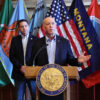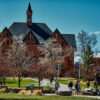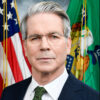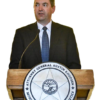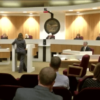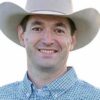Nobel Prize winning geneticist Bruce Beutler visits Montana State
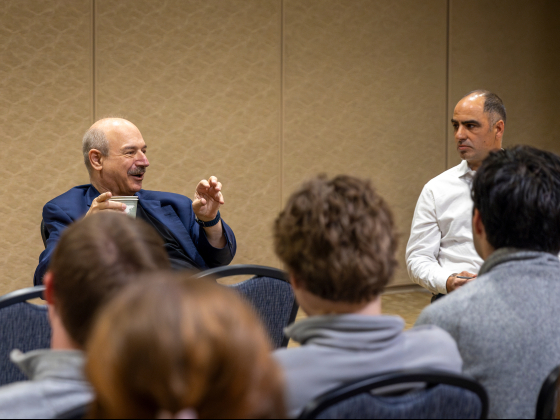
BOZEMAN – Dr. Bruce Beutler, winner of a 2011 Nobel Prize, highlighted the importance of curiosity and access to research opportunities as he visited Montana State University this week to give a public talk and meet with students and faculty.
Beutler won the Nobel in the physiology or medicine category for his research on innate immunity — the mechanisms through which the human body identifies an infection and activates an immune response. After initially practicing medicine, Beutler shifted his focus to research. He currently serves as the director of the Center for the Genetics of Host Defense at the University of Texas Southwestern Medical Center in Dallas.
During his daylong visit to MSU on Tuesday, Beutler delivered the Maurice Hilleman Distinguished Lecture, hosted by the College of Agriculture’s Department of Microbiology and Cell Biology. He spoke to a full house in MSU’s Procrastinator Theater, highlighting his current research, which focuses on the application of genetic phenotyping in treating various cancers.
“The Hilleman lecture provided an extraordinary opportunity to meet and listen to Dr. Beutler,” said Sreekala Bajwa, MSU vice president for agriculture and dean of the college. “His lecture was inspiring and educational. I thank Blake Wiedenheft and the Department of Microbiology and Cell Biology for creating this opportunity for the campus community to listen to a world-renowned researcher.”
Beutler also met with MSU faculty and toured campus during his visit, but the day kicked off with a seminar attended by more than a dozen undergraduate students from the Hilleman Scholars Program and MSU’s Honors College. The seminar was mediated by Blake Wiedenheft, a professor of microbiology who researches CRISPR, a bacterial immune system that can be used to edit RNA for potential applications ranging from vaccine development to disease treatments.
MSU’s high research capacity and proportion of undergraduate students make it one of an elite group of universities designated R1 by the Carnegie Classification of Institutions of Higher Education, and the university set a record for annual research expenditures this past fall at $230 million. Those expenditures helped support more than 850 undergraduate students and more than 600 graduate students and postdoctoral researchers.
In his discussion with the students, Beutler emphasized the importance of following curiosity, saying that his own had stemmed largely from nature.
“I was really interested in nature and science. I thought, ‘It’s so interesting that molecules arranged themselves into a living state, and I would like to understand that,’” Beutler said. “All of you here today seem to have something that really interests you, and that’s good. Settling on a key question is really important.”
Trained as both a medical doctor and a scientific researcher, Beutler’s long career has spanned a variety of subjects and practices but has always stemmed from a deep curiosity. Most of the students who attended are currently involved in undergraduate research, and for first-year student Jack Vincent, Beutler’s experience served as further inspiration.
“I just found his breadth of knowledge fascinating,” said Vincent, who has worked in MSU’s Wool Lab, drawing connections between research there and his major in biochemistry. “As a physician but also a scientist, you have to know so much, and I found his passion toward knowledge, science and research was just fascinating. That’s what I aspire to be. I want to know a lot but also be really passionate about what I know, not just for the sake of knowing it.”
Topics in the student seminar ranged from commercialization of scientific discoveries to translating technical topics for a broad audience. Beutler relayed how he learned he had received the Nobel prize – in the middle of the night while jet-lagged after a trip to Japan via an email on his cellphone. He said he Googled himself to see whether it was a prank.
“I was stunned,” he said. “Everything changed from that moment to the next and it felt a bit like it was a dream.”
He also noted that science as a calling requires a tremendous amount of time and dedication, so it’s important to find one’s own catalysts for inspiration and curiosity. Beutler said he’s an avid birdwatcher and that time outdoors helps him. Wiedenheft agreed, noting that its proximity to the natural world makes MSU an even better research hub for both students and faculty.
“I often say that if you feel more inspired under the shadow of mountains than you do under the silhouette of skyscrapers, then Montana State University might be the place for you,” said Wiedenheft.
Vincent said he particularly resonated with Beutler’s assertion that the best way to learn is through stories and personal experience.
“I think that pertains a lot to meaningful interactions with people, and bringing somebody this successful to the school is meaningful to me,” he said. “I can carry some of that into my profession as a scientist.”


